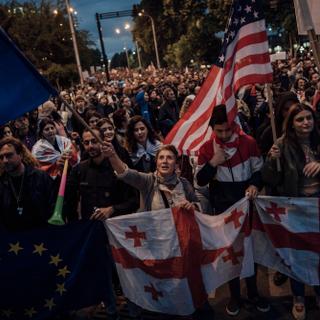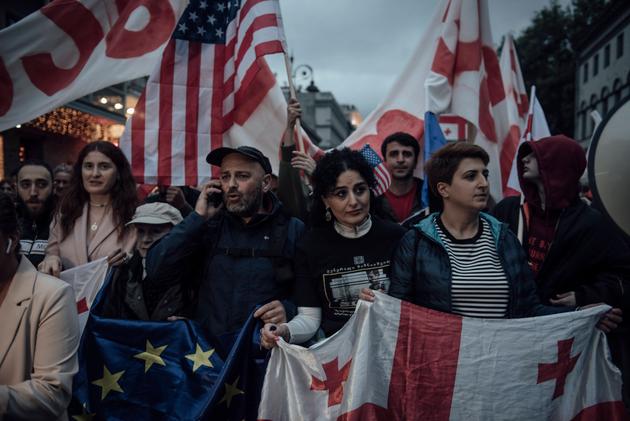


In Georgia, demonstrators ready themselves for a long fight: 'We don't want a new Maidan'
FeatureAt this stage, opponents of the 'foreign influence' bill are ruling out the possibility of revolution, hoping instead to oust the government at the ballot box in the October legislative elections.
This has never been seen before in Georgian memory. For almost two months now, the country has been shaken by demonstrations of an unprecedented scale, nature and duration, led by a fiercely pro-European youth and far removed from any political party. "It's organized chaos. Among ourselves, we call it the 'April awakening,'" said Salomé Qourdiani, a law student. "Perhaps it will enter into history under that name?"
Like thousands of other people, this young woman took part in yet another demonstration in the capital Tbilisi on Friday, May 24 to demand the withdrawal of the draft law on "foreign influence." Modeled on a Russian law, it aims to silence civil society and the media in this former Soviet republic in the Caucasus. "It's an existential battle: we risk losing Europe!" said Qourdiani. If enacted, the law, which was adopted on May 14 by Parliament, would effectively put a stop to Georgia's integration into the European Union (EU) – it has been an official candidate since December 2023 – and would bring the country back under the influence of Russia, whose troops have occupied 20% of its territory since the 2008 war with Moscow.
Until now, the ruling Georgian Dream party, founded by the country's strongman, billionaire oligarch Bidzina Ivanishvili, has ignored the protests and the international condemnation. On Friday, Washington hardened its tone by announcing "a new visa restriction policy [...] that will apply to individuals who are responsible for or complicit in undermining democracy in Georgia, as well as their family members." This measure has been welcomed with relief by the Georgian population, which is 80% pro-European and hopes that Western pressure will help it force the government to yield.
The demonstrators are also readying themselves. Supported by a large proportion of Georgians, the spontaneous, leaderless movement is now seeking to organize itself for the long term.

On this Monday in May, Tsiala Katamidze, a 36-year-old activist, was taking part in the first meeting of some 20 demonstrators from Batumi, one of the other hotbeds of protest in the west of the country. Most of them were students, while others were members of NGOs such as Transparency International. "All parts of society are mobilizing," she explained. "Not just young people, but also teachers, doctors, universities... So the objective now is to coordinate and build a solid, well-argued discourse in the face of the government's propaganda, which hammers us with falsehoods and wants to marginalize us."
You have 65.57% of this article left to read. The rest is for subscribers only.
